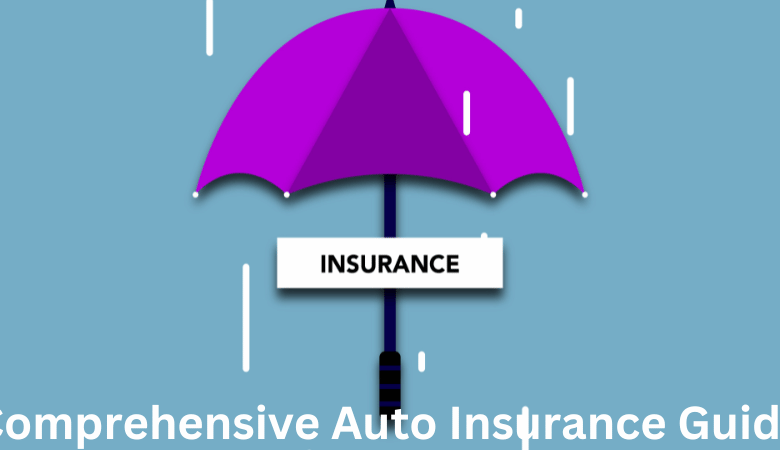Comprehensive Auto Insurance Guide

A comprehensive Auto Insurance guide can help you understand your policy and choose the right coverage for your needs. It can also help you save money on your premiums.
Comprehensive Auto Insurance Guide
A comprehensive auto insurance policy is a type of insurance that provides protection against physical damage or bodily injury resulting from a number of different sources, including but not limited to:
– Collisions with other vehicles
– Falling or flying objects
– Fire
– Theft
– Vandalism
A comprehensive policy typically also covers damages caused by weather events, such as hail or flooding.
While a comprehensive policy does provide a great deal of protection, it is important to remember that it does not cover everything. For example, it will not cover damages caused by:
– Driver error
– Mechanical failure
If you are considering purchasing a comprehensive policy, it is important to shop around and compare different policies to find the one that best meets your needs.
What is comprehensive auto insurance?
If you own a car, chances are you have some form of auto insurance. But what exactly is auto insurance, and what does it cover? Here’s a comprehensive guide to auto insurance, what it is, and what it covers.
Auto insurance is a contract between you and an insurance company that protects you financially in the event of an accident or other vehicle-related incident. Your auto insurance policy will contain various coverages that protect you in different ways.
The most common coverages are liability, collision, and comprehensive. Liability coverage protects you if you injure someone or damage their property in an accident. Collision coverage protects you if you damage your own vehicle in an accident. Comprehensive coverage protects you if your vehicle is damaged by something other than an accident, such as a natural disaster or theft.
There are also other optional coverages you can add to your auto insurance policy, such as roadside assistance and rental car reimbursement.
When you purchase auto insurance, you will typically be required to pay a monthly premium. Your premium is based on factors such as the coverages you have selected, the amount of coverage you need, and the deductible you have chosen.
Your deductible is the amount you will have to pay out of pocket in the event of an accident or other covered incident. The higher your deductible, the lower your premium will be.
Auto insurance is an important financial protection for all drivers. If you are involved in an accident, your auto insurance policy will help to pay for the damages. If you are found at fault, your auto insurance will also help to pay for the damages caused to the other party.
Auto insurance is required in most states, and you could face penalties if you are caught driving without it.
Now that you know a little more about auto insurance, be sure to shop around and compare rates from different companies before you purchase a policy.
What does comprehensive auto insurance cover?
Comprehensive auto insurance is one of the most popular types of car insurance coverage. It covers damage to your car that is not caused by a collision, such as theft, vandalism, or natural disasters.
If you have comprehensive insurance, it will cover the cost to repair or replace your car up to its actual cash value, minus your deductible. Comprehensive insurance is not required in all states, but it is typically required if you have a loan or lease on your vehicle.
While comprehensive insurance does have its advantages, it is important to remember that it will not cover the cost of repairs or replacements if your car is totaled in an accident. If you are looking for full coverage, you will need to purchase both comprehensive and collision insurance.
What are the benefits of comprehensive auto insurance?
There are many benefits to having comprehensive auto insurance. Perhaps the most obvious benefit is that it can help to pay for the repairs to your vehicle if it is damaged in an accident. It can also help to pay for the medical expenses if you or your passengers are injured in an accident. In addition, comprehensive auto insurance can provide coverage for theft, vandalism, and other types of damage.
One of the great things about comprehensive auto insurance is that it can give you peace of mind. If you are involved in an accident, you will not have to worry about how you will pay for the repairs to your vehicle or the medical expenses for yourself or your passengers. Your insurance will take care of everything.
Another benefit of comprehensive auto insurance is that it can help to keep your premiums low. If you have a clean driving record, you will likely pay less for your insurance than someone who has been in several accidents. And, if you have comprehensive auto insurance, you will probably pay even less than someone who does not have this type of coverage.
There are many other benefits of having comprehensive auto insurance. These are just a few of the most important ones. If you are looking for auto insurance, be sure to ask about this type of coverage. It may be just what you need.
What are the drawbacks of comprehensive auto insurance?
There are a few potential drawbacks to purchasing comprehensive auto insurance. First, it is typically more expensive than other types of insurance. This is because it provides more coverage than other types of insurance. Secondly, it may not cover all types of damage. For example, it may not cover damage caused by floods or earthquakes. Finally, it may have a deductible that you will need to pay before the insurance company will cover any damages.
How do I choose the right comprehensive auto insurance policy?
Auto insurance is a necessary purchase for all drivers. But with so many options available, how do you choose the right comprehensive auto insurance policy for your needs? Here are a few things to consider when selecting an auto insurance policy:
The first thing to consider is what type of coverage you need. There are four main types of auto insurance coverage: liability, collision, comprehensive, and personal injury protection.
Liability insurance covers damage that you cause to other people or property. It is the most basic type of auto insurance and is required in most states.
Collision insurance covers damage to your own vehicle in the event of an accident.
Comprehensive insurance covers damage to your vehicle from non-accident related events, such as theft, fire, or vandalism.
Personal injury protection covers medical expenses and lost wages for you and your passengers in the event of an accident.
Once you know what type of coverage you need, you can start comparing policies. When comparing policies, be sure to look at the following:
The policy limits: This is the maximum amount that the insurance company will pay out for a claim.
The deductible: This is the amount you will have to pay out of pocket before the insurance company will pay a claim.
The premium: This is the amount you will pay for the policy.
The coverage: This is the actual coverage that is included in the policy.
When comparing policies, be sure to get quotes from multiple insurance companies so that you can compare apples to apples. Also, be sure to read the fine print so that you understand what is and is not covered by the policy.
Once you have selected a policy, be sure to read the policy documents carefully so that you understand the coverage and the exclusions. If you have any questions, be sure to contact your insurance agent or company representative.
How do I file a claim under my comprehensive auto insurance policy?
If your car is damaged in an accident that is not your fault, or if it is stolen, you may be able to make a claim on your comprehensive auto insurance policy. Comprehensive insurance covers damage to your car that is not caused by collision, such as fire, theft, or vandalism.
To file a claim, you will need to contact your insurance company and provide them with a detailed description of the incident. You will also need to provide any supporting documentation, such as a police report or estimate of repairs. Once your claim is filed, your insurance company will investigate and determine whether or not to pay for the damages.




